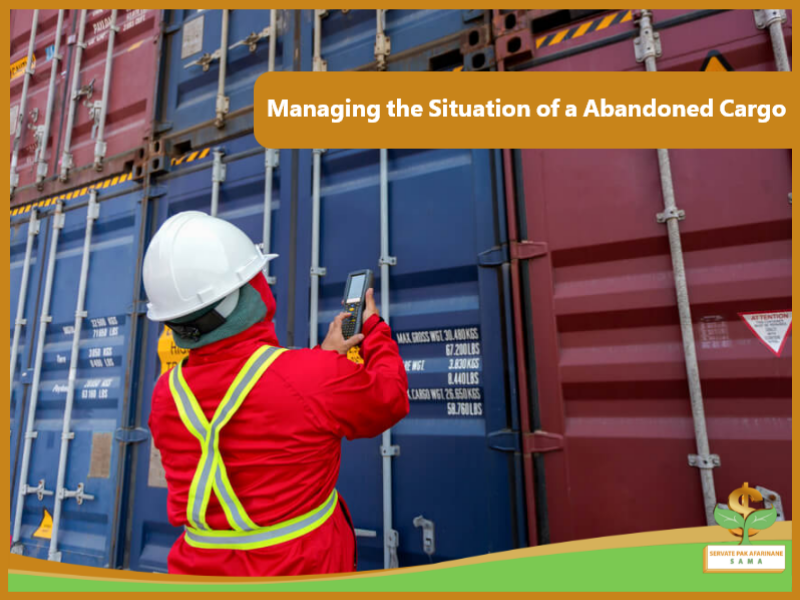
How to manage a situation of abandoned cargo?
Taking quick action can drastically mitigate cost exposure. Situations concerning abandoned goods can often see the associated costs rapidly exceeding the commercial value of the goods themselves, increasing the likelihood that the shipment remains uncollected. Furthermore situation between the carrier and freight forwarder will often be a complicated one, and the freight forwarder has an interest in acting quickly to avoid being hit first by demurrage and detention charges and other related costs. In this article, we are going to talk about how to manage a situation of abandoned cargo and also contractual considerations.
Speed is of utmost importance
The shipper and the consignee need to be contacted immediately, put on notice about the situation, and given a short deadline to collect the goods and settle any costs that have already accrued. Meanwhile, the freight forwarder should remain on full alert until the situation is resolved. Formal notification should be sent immediately after the expiry of the “free time” and any provided deadline, explaining the parties’ rights and obligations under the contract of carriage and/or other incorporated trading conditions, specifically warning that any further delay or failure to take delivery will result in legal proceedings.
Meanwhile, demurrage and detention costs should be mitigated as far as reasonably practicable as the freight forwarder will often have to make such payments in the event that such charges are not paid by the consignee or shipper. In some jurisdictions, this may even be expressly stated in the law. Consultation with local agents will offer guidance on how to go about this most effectively. Alternative storage solutions, for example, will often prove far less costly.
In the instance that the cargo is abandoned, a final notice should be issued, explicitly stating that the necessary measures will be taken, including sale or disposal, and that all associated costs incurred will be on the customer’s account. It is advisable to secure letters of abandonment from both the shipper and the consignee, including a clear undertaking that they are jointly and severally responsible for all accrued costs. A Letter of Abandonment of Cargo will also generally need to be sent to the authorities, requesting the authorities to allocate a date for the disposal or auction of the goods.
It is vital that freight forwarders pay close attention to the national and procedures and legislation around dealing with cargo, as this varies from one country to another. For example, in China, the sale of cargo requires a court process in order to ensure appropriate price control. In Canada, the legislation sets out requirements for the enforcement of liens arising from the storage of goods, however, there are no formal requirements by law for the sale of goods subject to a maritime of carrier lien.
Contractual considerations- is the freight forwarder performing as principal or agent?
When the freight forwarder as NVOC issues their own house bill of lading, invariably they will be named as the shipper on the ocean bill of lading, establishing a direct contractual connection as a principal to the contract for carriage. In the event that the cargo is abandoned, the freight forwarder acting as NVOC will have a contractual liability towards the shipping line for any related costs. these costs can swiftly outstrip the value of the cargo itself, and thus can not be mitigated simply by advance payments or securities. close attention should therefore be taken in relation to the formulation of the contract itself, including the terms related to responsibility for costs.
When the cargo has been shipped under an ocean bill of lading only and no house bill of lading has been issued, it is likely that the named shipper is the actual shipper of the cargo and the freight forwarder has performed as agent only. The freight forwarder may either be named as the notify party or not at all on the face of the bill. In such cases, the shipping line will have a direct contractual relationship with the actual shipper and consignee under their bill of lading and the carrier should look to them for recovery of charges. Bringing a claim against the actual shipper, however, might not be an attractive deed, noting for example that the shipper might be domiciled in an unfavorable jurisdiction or might not have enough assets to cover the cost of the claim.
The shipping line will generally have rights under their bill of lading terms to hold cargoes subject to the lien and eventually auction the goods, offsetting their incurred costs. There is no obligation on them to do so and they might choose not to take such action if the cargo is of low value or recovery is problematic.
In such cases, carriers might try to recover from freight forwarders based on their tariff or on the ‘Merchant Clause’ now commonly appearing on carriers bills of lading and which purports to place full liability on forwarding agents and notify parties. It is the view of ABLM that carriers should not be able to impose liability on forwarders performing as agents only, and forwarders facing such carrier claims for charges should ask for legal advice promptly.
Of course, this depends on the jurisdiction. In some jurisdictions, the binding effect of any contractual obligation requires consent by the obligor. Consequently, the terms of the so-called ‘merchant’ clauses are not enough by themselves to create obligations for the persons named in there, and freight forwarders should pay close attention to whether such clauses are legally enforceable.
In certain jurisdictions, specific rules have been enacted depending on the mode of transport. In some instances, this may even include legislation specifically considering freight forwarders to be the carrier in the contract or to have concluded contracts on their own behalf and for their own account, regardless of the actual terms of the contract. This may be the case even in spite of the fact that the terms of the contract, deviate from the principles of freedom of contract, agency, and interpretation of contracts, and has been justified by the need to protect shippers in relation to certain modes of transport. For more information about how to manage a situation of abandoned cargo, please check the link.


